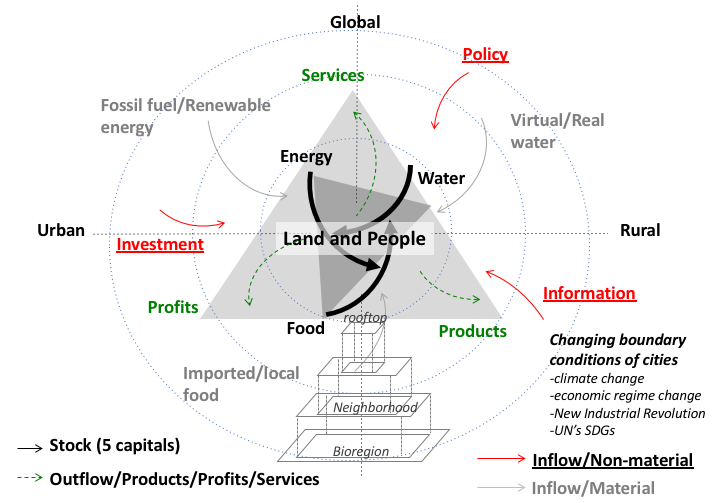M-NEX is the internationally joint research project “The Moveable Nexus: Design-led Urban Food, Energy and Water Management Innovation in New Boundary Conditions of Change“, granted by Belmont Forum/JPI Urban Europe granted (No. 11314551), and led by Dr. Wanglin Yan, Professor, Faculty of Environment and Information Studies, Keio University, Japan under the international consortium with 7 partners from 6 countries.
Urban communities are particularly vulnerable to the ongoing and expanding need for food, water and energy. That vulnerability is further exacerbated by the onset of climate change, underlining the need to manage each of the elements together, in the form of a FEW nexus.
This internationally diverse project, based around urban design and practice, sees urban agriculture as a key facilitator of the Nexus, needing water and energy to become productive. This project will develop innovative and practical design solutions through stakeholder-engaged living labs in six different bioregions, Belfast, Doha, Detroit, Tokyo-Yokohama, Amsterdam, and Sydney. Each group will aim to translate current FEW-nexus research into real projects.
Three integrated knowledge platforms, namely Design, Evaluation and Participation, will be used to capture inter-disciplinary approaches to the problem of building a true nexus (M-NEX), and will be used to guide participatory workshops. Outputs and lessons learned will be publically shared via the open M-NEX platform.
The production and consumption of healthy food can only be ensured by managing the impacts of change, including climate change, demographic change, and cultural transformation. Every scale will additionally need to be considered, looking to something as small as a single rooftop and as large as a metropolitan region. The design outputs are the cornerstones of the entire field of possible solutions and are used to inspire individuals to undertake informed actions using the M-NEX platform. A decision support platform aimed at the local government level will be a powerful tool for integrating nexus thinking into FEW management.
Working directly with living labs in some of the most vulnerable communities in the partner cities, the team aims to co-design new food futures with stakeholders that leave them less vulnerable to the forces that get in the way of forming a holistic solution (ie, the nexus). Lessons learned from these stakeholder workshops will be shared freely, so that lessons learned locally can be applied around the world.

